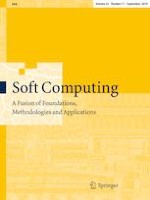19.06.2019 | Methodologies and Application
Fuzzy-based modified particle swarm optimization algorithm for shortest path problems
Erschienen in: Soft Computing | Ausgabe 17/2019
EinloggenAktivieren Sie unsere intelligente Suche, um passende Fachinhalte oder Patente zu finden.
Wählen Sie Textabschnitte aus um mit Künstlicher Intelligenz passenden Patente zu finden. powered by
Markieren Sie Textabschnitte, um KI-gestützt weitere passende Inhalte zu finden. powered by
